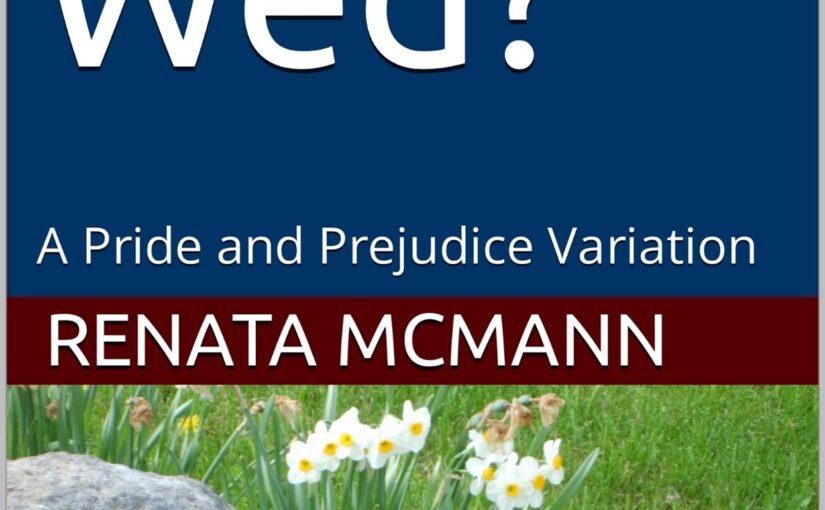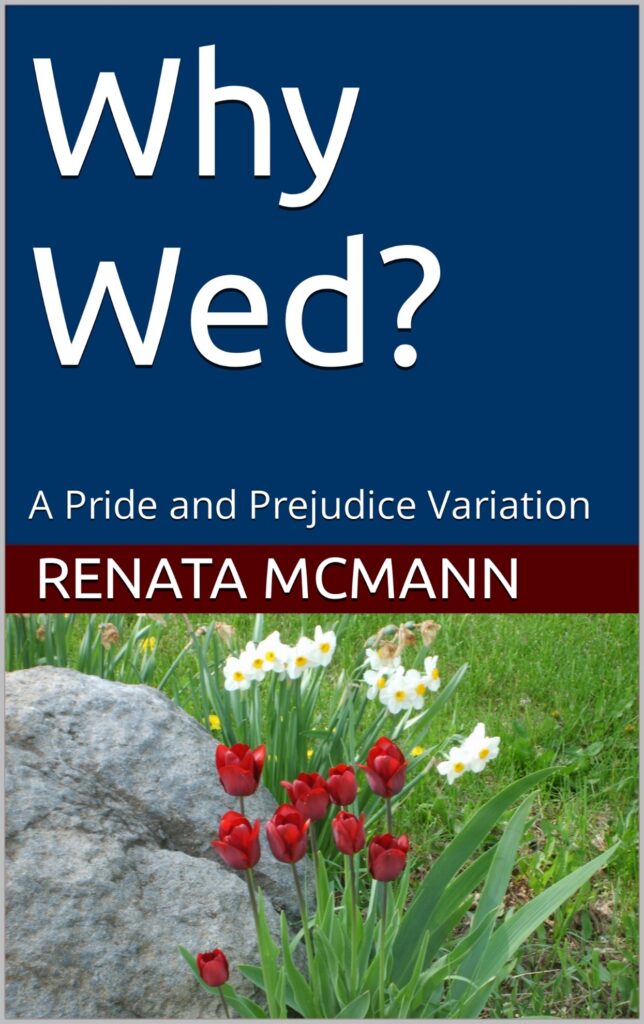Announcing Why Wed? a Pride and Prejudice Variation
by
Renata McMann
Elizabeth has an older half-brother Thomas, who is estranged from his family because he refused to break the entail. Despite her mother’s objections, Elizabeth goes to keep house for him at the Hunsford Parsonage near Rosings, where she meets Mr. Darcy again.
Mr. Darcy decides to marry his cousin Anne de Bourgh, but that doesn’t work out as planned.
Many characters from Pride and Prejudice marry for a variety of reasons, including health, wealth, and of course, love.
This sweet Pride and Prejudice novella has about 28,000 words. Note: is also available on Kindle Vella.
You can find Why Wed? on kindle here: http://getbook.at/WhyWed
Chapter 1 Longbourn, Elizabeth
Elizabeth Bennet had already made a formal condolence call on her recently widowed friend, Charlotte Collins, but she felt a second, more private call was appropriate. Charlotte’s parents, Sir William and Lady Lucas, had taken their daughter in after her very short marriage had ended with the death of her husband from smallpox. Charlotte was arrayed in widow’s black but was not weeping in her room. Instead, she returned to her former occupation of helping run her parents’ household with no sign of recently tears shed.
“I wonder how they managed in your absence,” Elizabeth said. She had joined Charlotte in the kitchen and the two of them were preparing potatoes for stew. This wasn’t something Elizabeth did at home, but it allowed her time with her friend.
Charlotte grimaced. She then took a potato and chopped it to tiny pieces.
“What are you doing?” Elizabeth asked.
“We are out of flour,” Charlotte said. “I’ve been told that potato can thicken stew. I’ve never tried it, but if I cut the potatoes in small enough pieces, it should help.” Charlotte kept chopping.
“Out of flour?”
“Yes. I shouldn’t criticize my sister. She tried but—” Charlotte broke off.
“She hasn’t yet learned to take over all the jobs you did,” Elizabeth supplied.
“She’s young to run a household, but our cook quit and neither Maria nor my mother had spent enough time in the kitchen. In fairness, Maria did very well with the chickens and the mending.”
“At least you are appreciated.”
“Exactly. From my point of view, my absence was the perfect length. My family is glad to have me back because Maria hasn’t yet learned to replace me.”
“If it had been longer, Maria would have learned your job. If it had been shorter, there wouldn’t have been time for things to have gone wrong.”
“So, I am appreciated here. I’m a respectable widow, rather than a pitied spinster. Lady Catherine has arranged a pension for me of twenty pounds a year, which is generous considering how short a time I was married. And I inherited Mr. Collins money, which gives me another £150 a year. I’m not wealthy, but I’m not poor. I received a bit of additional money from Lady Catherine for the contents of the parsonage.”
“You sold the furniture?”
“Furniture, linens, cooking utensils, everything. My father didn’t want to take anything home because some people here aren’t immune to smallpox.” Elizabeth had no idea if Sir William’s caution was warranted, but she certainly understood the fear.
Elizabeth looked at the faint smallpox scars on her friend’s face. They weren’t related to her husband’s recent demise, but from twelve years earlier. It changed Charlotte from an ordinary fifteen-year-old girl to someone who was plain. It had inspired Elizabeth’s mother to see her daughters and herself were vaccinated, although it took her several years to find how to get it done. “That was generous of her.”
“It was. I’ve been lucky.” After a long pause, Charlotte added, “Not in that my husband contracted smallpox three days after the wedding, but that I came out of the marriage better off than I went in.”
She was better off both financially and by having attained the status of a widow.
Elizabeth had a brief, odd feeling of envy for Charlotte. Mr. Collins was a distant cousin of Elizabeth, who had visited the Bennets to find a wife. Elizabeth had refused his offer of marriage which infuriated her mother, since her mother’s goal in life was to marry her daughters off. Mr. Collins had turned to Charlotte who was more interested in the status and financial security a husband offered than in his character. Elizabeth could be in the position of relative financial independence if she had accepted Mr. Collins’ offer. The fleeting feeling disappeared very rapidly when the image of Mr. Collins came into her mind. Amusement hit her. Wasn’t there some quote? “Nothing in his life became him like the leaving it.” The only reason she thought of the marriage to Mr. Collins as being desirable, was that he died.
Elizabeth had another motive for visiting Charlotte. Life at home was becoming increasingly unpleasant. She knew her mother would be angry with her for at least a day, since her fortnightly letter from Thomas would come. Although she looked forward to her brother’s letters, she did not look forward to her mother’s rant. At least her mentioning Elizabeth’s refusal to marry Mr. Collins was no longer brought up as often.
But when she arrived home, she found she was saved from the rant. “There’s no letter,” her mother crowed. “Maybe he’s dead.” When no one responded, she said, “With Mr. Collins dead, if Thomas dies, the entail is broken. Wouldn’t that be wonderful.”
“I do not consider the death of my son as wonderful,” Mr. Bennet said.
“But it would be. Then you can will the property as you wish, and we won’t have to worry when you die.”
“Mrs. Bennet,” Elizabeth’s father said, “It is highly inappropriate for you to wish for the death of my son.”
“But he wouldn’t break the entail,” Mrs. Bennet countered.
“Even if I am angry about that, it doesn’t mean I want him dead.”
“He has no family feelings,” Mrs. Bennet said. “Last time he visited here he stayed less than two days and was very picky about his food. I provide a good table and he hardly ate anything. He even accused me of trying to poison him.”
“He said what you served him made him sick,” Elizabeth said, unable to keep silent on the issue.
“It didn’t make anyone else sick,” Mrs. Bennet said triumphantly.
It hadn’t, but with her long correspondence with her half-brother, Elizabeth was aware of the lengths he went to avoid eating wheat. Elizabeth remembered her grandfather didn’t eat bread, saying that it gave him indigestion. Surely, Mrs. Bennet remembered her own father had a mild problem like the one Thomas had. Jane once brought it up, but Mrs. Bennet dismissed its relevance by saying old people often had imaginary digestive problems.
As the days went by without a letter. Elizabeth assumed it had gone astray and didn’t worry much, but each day Mrs. Bennet was happier and happier, and even talked about inquiring if Thomas Bennet had died, but his letter arrived five days late.
“I don’t suppose he’s changed his mind about the entail,” Mrs. Bennet asked, as she always did.
“No.” Since her mother always asked that question, Elizabeth didn’t need to answer in any detail.
“He’s content to let his family live in poverty when Mr. Bennet dies,” Mrs. Bennet complained as usual. “He never does anything to help any of us.”
“He did offer,” Elizabeth’s sister Mary said.
“Inadequate and ridiculous,” Mrs. Bennet said. “Imagine a son telling his mother what she can say.”
“Now he’s your son?” Mr. Bennet asked.
“He would be my son, if he had been dutiful.”
Elizabeth decided to discuss the contents of Thomas’ letter privately with their father. She was tired of the anger her mother continually expressed toward Thomas, who was a product of an earlier marriage. When Mr. Bennet was widowed with a two-year-old son, his deceased wife’s mother took Thomas in and raised him until he was old enough to go to Eton, even though Mr. Bennet remarried when his son was five. Thomas spent the time he wasn’t in school with his grandmother, only visiting his father’s family twice a year.
But when Thomas was eighteen, Mrs. Bennet presented him with an agreement to break the entail when he reached twenty-one. He refused to sign, which led to a rift between him and the Bennets. His grandmother paid for Cambridge and Thomas was ordained at twenty-three. He became a curate in a largely rural parish and lived in a room in a farmhouse near the church.
When his grandmother died three years later, Thomas inherited two thousand pounds. He then wrote his father and made an offer. He would sign a document saying that after Mr. Bennet died, he would give each of his five sisters fifty pounds a year until they married. In return, he would live with the Bennets, receive an allowance of £200 a year, he would be fed a diet that did not include wheat, and Mrs. Bennet would never complain about the entail to anyone.
It lasted less than a week. The only condition that was met was Thomas receiving £50 as his first quarter’s payment. He repaid his father and left, after becoming sick from what he was served. In addition, Mrs. Bennet could not hold her tongue. She considered the conditions unreasonable. She was to receive nothing from Thomas, and her daughters could hardly live on fifty pounds a year. She complained to anyone who would listen. She did not mention that since she had the five thousand pounds that was settled on her, she would have an income of £250 pounds a year. Thomas visited again but left when little attention was paid to his dietary requests.
Elizabeth waited until it was unlikely her mother would connect Thomas’ letter to her slipping into the library. Perhaps her mother was fooled, but her father wasn’t. “What did Thomas have to say?” he asked.
“He wants me to visit. No, it’s more than a visit. He has a living, and he wants me to help with his household for a while until he gets settled.”
They discussed the details for a while and then announced it to Mrs. Bennet. For once, Mrs. Bennet was uncertain as to what to say. She was angry with Elizabeth both for refusing a marriage proposal from Mr. Collins and corresponding with Thomas, but she was genuinely glad to get rid of her least favorite daughter for months. When Mr. Bennet announced he was going to escort Elizabeth to Kent, where the Thomas held a living, Mrs. Bennet had a legitimate source of complaint. He was taking the carriage.
“Aside from not approving of Elizabeth traveling alone, I would like to see my son,” Mr. Bennet explained.
“He’s an undutiful son,” Mrs. Bennet said. “You should not see him.”
“Enough. Would you have married me if I had signed away my rights under the entail and my father willed his property to someone else?”
“You owned the property when we married,” Mrs. Bennet said. Elizabeth wasn’t quite sure if that qualified as a non sequitur.
Mr. Bennet’s comment changed the subject. “By the way, the living Thomas has is the same one Mr. Collins had.”
“But that was eight or nine hundred pounds a year! How could he afford that?” Mrs. Bennet protested, clearly unhappy that Mr. Bennet’s son had so high an income.
Thank you for reading.
You can find Why Wed? on kindle here: http://getbook.at/WhyWed

